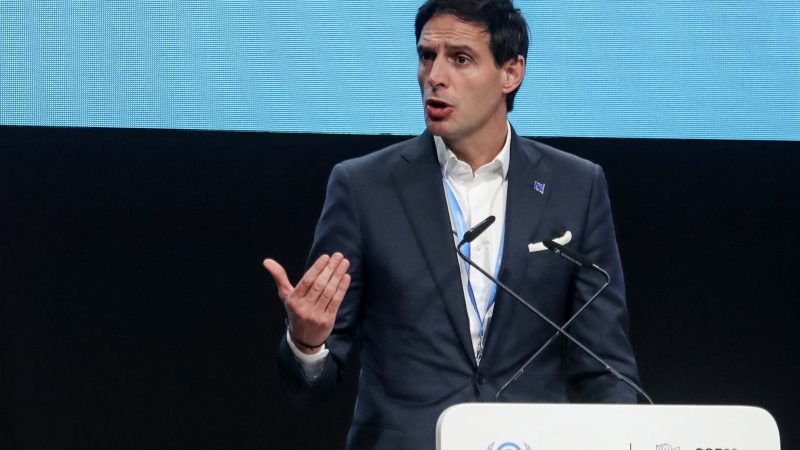
After the COP29 global climate talks in Azerbaijan concluded at 3am local time on Sunday (24 November), the EU welcomed a deal to triple global climate finance until 2035 to $300 billion but criticised the lack of agreement on concrete climate action.
By the time the 29th world climate conference concluded, it had overrun by more than 30 hours. After initial fears that talks could collapse, negotiators found an agreement on the figure for global climate finance until 2035: $300 billion per year.
At the start of the meeting, experts cited a need for an overall climate finance goal of $1.3 trillion.
“COP29 will be remembered as a start of a new era for climate finance,” said the EU’s chief negotiator, Climate Commissioner Wopke Hoekstra, in his closing remarks to the Baku assembly.
In 2015, developing countries pledged to give $100 billion per year to poorer countries to aid them in their fight against climate change. This figure was based on a 1993 split that saw countries like China and the Gulf states placed in a category of countries entitled to receiving climate finance.
Heading into COP29, the EU sought to push for wealthy non-contributing nations to pay up while remaining cautious about making their own financial commitments.
In the final agreement, rich countries managed to keep the target at $300 billion—while countries like China are “encouraged” to make “voluntary contributions” particularly “through South-South cooperation.” A compromise that pressure groups and developing nations say falls short.
“The goal still leaves a big gap to fill,” said Rob Moore, associate director at clean-energy think-tank E3G. CAN Europe called it a “dangerous void.” Speaking at the closing assembly, a Nigerian representative said, “$300 billion until 2035 is a joke.”
German Foreign Minister Annalena Baerbock, called it an “approach that does not overpromise large funds, but actually delivers for those most vulnerable.”
The EU has “learned from our mistakes in the past,” she added. Before 2022, developed countries had failed to even meet the $100 billion target, which complicated climate negotiations in the UK at COP26 in 2021.
“We feel it is ambitious, it is needed, it is realistic, and it is achievable. And we are confident that this will be a tale of delivery,” said Hoekstra.
The agreement contains a review clause to increase this figure in 2030, based on reports commissioned for 2026 and 2027—to be known as the “Baku to Belém” dialogue, where COP30 will be hosted in Brazil.
Frozen conflict on climate action
While the deal on climate finance proved controversial, agreeing to restate the climate action measures agreed upon last year at COP28—tripling renewables, and doubling energy efficiency improvements until 2030—were removed off the table at the last second, minutes before COP29 closed.
The text remains unchanged from last year, with no concrete follow-up. That means the pledge, which was spearheaded by the EU, “is on life support,” said Natalie Jones of observer group IISD.
“It is less than what we would have liked, but it is better than we feared. We are all unhappy about losing a year. (But) We are happy not to lose this fight. And it is not over,” said Hoekstra.
Austrian Climate Minister Leonore Gewessler said the outcome meant “no progress, no regression. That is not much—but it is all that was possible this year.”
Finally, a deal on global carbon markets
Another key EU priority was to agree on common standards for CO2 removal and allow for richer nations to make up for climate shortcomings, by buying up the results of more ambitious climate action—known as Article 6 in the Paris Agreement.
“We have witnessed the historical conclusion of the rule book for carbon markets. We now have standards with a UN stamp of approval on it,” said Hoekstra—the EU has long championed CO2 trading, pointing to the success of its domestic scheme (EU ETS), where emissions went down by 15.5% in 2023.
Not all are as optimistic. “Despite the best efforts of activists and some climate negotiators, the agreement reached on Article 6 carbon markets at COP29 in Baku risks facilitating cowboy carbon markets,” said NGO Carbon Market Watch.
With a lack of transparency and accountability, “it seems countries were more willing to adopt insufficient rules and deal with the consequences later, rather than prevent those consequences in the first place,” the group explained.
Instead of sanctions for countries providing bogus CO2 certificates, the text foresees only a mechanism to resolve “inconsistencies”, without a specific deadline.
[Edited by Donagh Cagney/Rajnish Singh]
